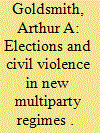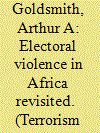| Srl | Item |
| 1 |
ID:
141229


|
|
|
|
|
| Summary/Abstract |
The introduction of multiparty competition around the world following the Cold War raises the specter of rising civil violence during election periods in emerging democracies and hybrid regimes. Yet there are also plausible theoretical reasons to expect dropping civil violence around elections in these states or, alternatively, no significant change in the level of such conflict. This article tests these hypotheses in Africa with the aid of event data on the daily rate of civil violence incidents (1997–2013). It asks if civil violence in that region is more frequent, less frequent or constant during election cycles compared to other times. To guard against definitional and data selection problems encountered in some prior cross-national studies of elections and use of force, the research design emphasizes the relative risk of social conflict at the national level. The analysis suggests three distinct patterns in Africa. Given countrywide norms, election periods in most countries run the same relative risk of a day with violent events as do non-election periods. A subset of African countries exists, however, with more civil violence during elections when judged against the national reference line for conflict. There is a smaller group of countries where the risk of electoral civil violence is comparatively low. While caution should be exercised in interpreting the findings, the policy implication is that no general reason exists to preclude or defer elections in Africa as a way to minimize social conflict associated with political campaigns, although there may be specific reasons to do so in particular countries.
|
|
|
|
|
|
|
|
|
|
|
|
|
|
|
|
| 2 |
ID:
142525


|
|
|
|
|
| Summary/Abstract |
This article addresses the still unsettled question of the incidence of violent election periods in Africa. It uses two new datasets, which report episodes of social conflict in the region for 1990–2011, and elections worldwide from 1960 to 2010. When combined, these data suggest that onsets of electoral violence peak around major election days in Africa as a whole, but with wide national variability in the volume of new episodes. Depending on the time span and type of social conflict, from one-quarter to three-quarters of the elections for national leadership have been without incident. The article also investigates the timing of electoral violence and the extent to which there is an experience curve effect, whereby subsequent elections have fewer onsets of social conflict. The data indicate that two-thirds to three-quarters of elections are free of onsets of social conflict, but that the proportion does not change much with experience. Overall, there appear to be reasonable grounds for optimism about peaceful elections in many African countries.
|
|
|
|
|
|
|
|
|
|
|
|
|
|
|
|
| 3 |
ID:
083705


|
|
|
|
|
| Publication |
2008.
|
| Summary/Abstract |
Democracy promotion is a favored strategy to advance the cause of world peace, especially in the Greater Middle East, but undifferentiated democracy promotion has two faulty premises. First, all progress toward the establishment of democratic regimes does not necessarily make the global community safer. Second, regime change is not something external actors have the capacity to direct along desired pathways. The first assumption fails to consider the well-documented security problems caused by partial democracies. The second assumption overstates the ability of powerful outsiders to induce transitions to full democracy. These research findings are grounds for cautious and selective democracy promotion, not a blanket approach that is indifferent to the composition of the regimes designated to be reformed and democratized.
|
|
|
|
|
|
|
|
|
|
|
|
|
|
|
|
| 4 |
ID:
099368


|
|
|
|
|
| Publication |
2010.
|
| Summary/Abstract |
Political violence in sub-Saharan Africa is down. The number of military dictatorships and one-party states is also down. Are the two trends related? Conventional democratic peace theory says the answer is yes, because the relationship between democracy and peace is linear and positive. A revisionist view, however, raises questions. The majority of Africa's new regimes are not full democracies but mixed regimes that some studies find to have the greatest propensity to violent behaviour. Using statistical analysis of a trichotomous classification of African regimes from 1960 to 2008, this article suggests that neither argument fits the facts. Autocracies and partial democracies in this region appear to have similar exposure to conflict, with both types of systems suffering more conflict than full democracies. Variables other than regime type appear to be the driving forces behind these trends.
|
|
|
|
|
|
|
|
|
|
|
|
|
|
|
|
| 5 |
ID:
078789


|
|
|